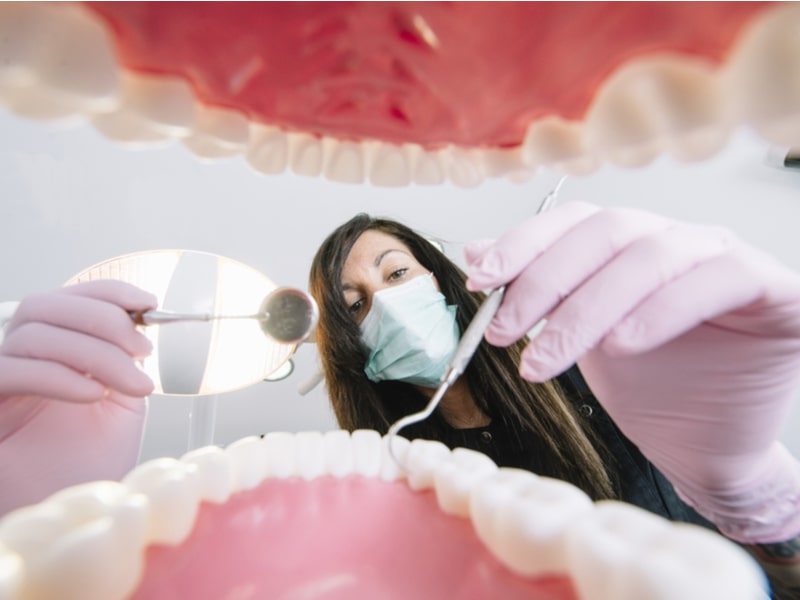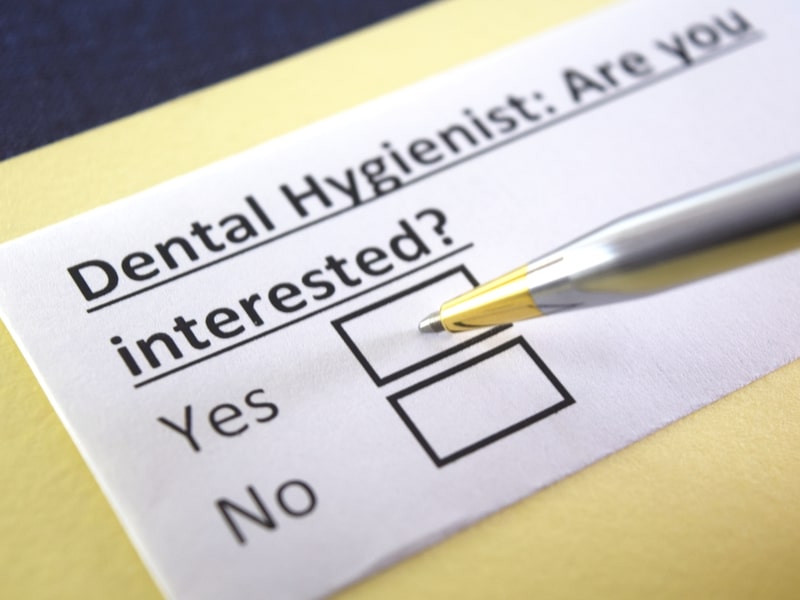Why are Dental Hygienists Paid So Much?
So, you heard that dental hygienists make a lot of money. You are thinking about becoming one but wondering if it’s a profession worthy of your hard work in college and, eventually, a dental office.
Dental hygienists are paid so much because they are licensed professionals working in the dental care industry. Oral health is important, and failure to take good care of the teeth and gums can lead not only to dental issues but other serious health problems, too, such as diabetes and heart disease.
Read on to know why taking care of the smiles of others by profession can leave you with a beaming smile!

Is a Dental Hygienist the Same as a Dentist?
A dental hygienist is not a medical doctor. On the other hand, a dentist is. A dental hygienist assesses the oral health of patients, keeps the mouth clean to keep dental problems at bay, and assists a dentist. A dentist specializes in the diagnosis and treatment of various dental or oral diseases.
Many think that dental hygienists and dentists are one and the same. But then there are also those who believe that dental hygienists are just the assistants of dentists.
It’s true that a dental hygienist is not a dentist. What’s not true is that a dental hygienist is only an assistant.
A dental hygienist may assist a dentist alright. This is especially true if there are a lot of things that need to be done in the dental office. However, a dental hygienist carries out many other roles, too. He or she can perform the majority of them independently, usually with minimal supervision from a dentist.
Similarly, a dental hygienist can evaluate the oral health of patients. However, he or she cannot diagnose them. Suppose a dental hygienist observes that there is a problem. In that case, he or she will refer the patient to a dentist in order to obtain a diagnosis as well as undergo the necessary treatment.
Is It Easy to Become a Dental Hygienist?
Becoming a dental hygienist requires the same level of discipline and commitment as becoming a dentist. To become a licensed dental hygienist, one must have an associate or bachelor’s degree in dental hygiene (ADH or BSDH) and then take and pass the National Board Dental Hygiene Examination (NBDHE).
The first step to working as a dental hygienist one day is figuring out how many years you wish to spend in college and where you want to take your career.
Some people earn an associate degree. In contrast, others choose to earn a bachelor’s degree. Each one of the two comes with its own set of pros and cons. Both degrees will prepare you for the dental hygienist licensure exam which, if you pass, will enable you to get your license and work as a registered dental hygienist.
Let’s take a look at the advantages of each approach to becoming a dental hygienist one day:
Associate degree
- Provides a faster way to become a professional.
- Generally easier on the pocket.
- A stepping stone to earning a bachelor’s degree.
Bachelor’s degree
- More in-depth preparation and training.
- A necessity for graduate school.
- Provides a wider variety of career opportunities.
Related Article: How Hard is Community College
Advantages of Being a Dental Hygienist
Being a dental hygienist lets one enter the healthcare field, particularly the dental profession, without being in school for years. After being registered, a dental hygienist can start making a difference in people’s lives. He or she can choose from various jobs and earn a good amount of income.
While being a dentist will put you at the top of oral health care providers, being a dental hygienist comes with many perks, too. And if it’s the profession you want, it is also something that can be rewarding.
Let’s take a quick look at some of the positives of choosing to work as a dental hygienist:
- Spending less time in college. Because dentists are medical doctors, they have to spend eight years in college. And if they want to specialize in one of the 12 dental specializations, they have to do two to three years of residency. On the other hand, dental hygienists have to be in college for two to four years only.
- Enjoying plenty of career opportunities. Just because you are a dental hygienist doesn’t mean that you can only work as a clinician at a dental office or hospital. If you want, you can become many things — an educator, a consumer advocate, researcher, consultant, sales marketer, etc.
- Helping people. Do you enjoy interacting with people and helping them have better lives, too? Then you will surely find being a dental hygienist a fulfilling career. Besides patients who wish to have a beautiful smile, as a dental hygienist, you also get to lend a hand to dentists with a lot on their plate.
- Making lots of money. Last but not least, working as a dental hygienist allows you to get a handsome paycheck every month. It makes it possible for you to enjoy a well-paying career in the healthcare field without spending tons of time and cash in college to become a dentist or any other type of medical doctor.

How Much Do Dental Hygienists Make per Hour
For the year 2020, the average salary of dental hygienists amounts to $37.06 per hour. Dental hygienists fresh from college tend to work between 36 to 40 hours per week. So, in other words, dental hygienists who have just started their careers can make anywhere from $5,336.64 to $5,929.60 per month.
Dental hygienists can make a lot of money, depending on industry experience and the healthcare setting, too.
As a matter of fact, according to the US Bureau of Labor Statistics (BLS), dental hygienists can earn more than registered nurses every year. The average annual salary of dental hygienists in the US is $77,090. On the other hand, the average annual salary of registered nurses in the US is $75,330 only.
Keep in mind that various things can have an impact on how much money a dental hygienist can make.
Someone who has been working as a dental hygienist for many years, however, tends to work fewer hours a week than someone who is new to the dental profession, and still receives a bigger paycheck every month.
However, it’s not just the length of experience that tends to determine one’s salary as a dental hygienist. Where you work is also a factor.
For instance, it’s not uncommon for a dental hygienist employed at a large private dental office to make more money than a dental hygienist working at a public health clinic.
So, can a dental hygienist become rich? Dental hygienists can become rich if they work hard — the longer they are in the healthcare industry and the more prestigious their workplace, the more money they can rake in.
Related Questions
How often is a dental hygienist visited by patients?
As a general rule, most people should visit a dental hygienist every six months. Some may have to visit a dental hygienist less often, while others may have to visit a dental hygienist more often. Some of them include people who smoke, have ongoing oral issues, and are at risk of dental problems.
Can a dental hygienist become a dentist?
Dental hygienists can become a dentist if they have a bachelor’s degree in Dental Hygiene (BSDH) and then attend a dental school for another four years to earn either a degree in Doctor of Medicine in Dentistry (DDM) or Doctor of Dental Surgery (DDS). Completing a residency is needed for a specialization.
Do Nurses or Dental Hygienists Make More?
According to the Bureau of Labor Statistics, the median annual salary for dental hygienists is $77,090, while the median annual salary for RNs is $75,330. In the long run, however, earning potential for RN is higher than for RDH. The highest paid RNs make more than $116K annually, while top paid dental hygienists make $104K per year.
Conclusion
Because it can take a while before you can become a dental hygienist, depending on the degree you wish to earn, you should first ask yourself: is being a dental hygienist worth it?
Above, we talked about how much money dental hygienists make and how they became dental hygienists in the first place. If you are thinking about entering the healthcare industry as one, see to it that you have what it takes to pass the dental hygienist licensure exam and what it needs to become a trusted and reputable dental hygienist.
Read Next: 10 Unique Benefits of Women’s Colleges
Disclaimer: The views and opinions expressed in this article are those of the authors and do not necessarily represent those of the College Reality Check.




